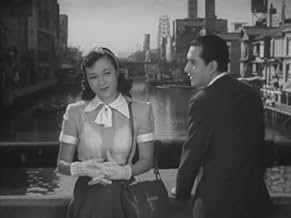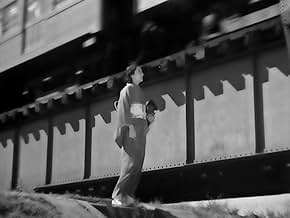Meshi
- 1951
- 1h 37min
CALIFICACIÓN DE IMDb
7.6/10
1.9 k
TU CALIFICACIÓN
Agrega una trama en tu idiomaMichiyo lives in a small home in Osaka and is not happy with her marriage; all she does is cook and clean for her husband.Michiyo lives in a small home in Osaka and is not happy with her marriage; all she does is cook and clean for her husband.Michiyo lives in a small home in Osaka and is not happy with her marriage; all she does is cook and clean for her husband.
- Premios
- 9 premios ganados en total
Argumento
¿Sabías que…?
- TriviaThis film revived the shomingeki sub-genre in which lower middle class and struggling families are depicted.
- Citas
Michiyo Okamoto: [voiceover] My husband is sitting at the table. I bring a pot of miso soup from the kitchen. Yesterday, today, and tomorrow, for 365 days a year, morning and night, come and go unvaryingly. With a life restricted to the kitchen and the family room, must every woman grow old and die feeling empty?
- ConexionesReferenced in Century of Cinema: Nihon eiga no hyaku nen (1995)
Opinión destacada
Repast is the first of many films by Mikio Naruse to be based on the stories of Fumiko Hayashi, in this case on Hayashi's last unfinished novel. Repast is a family drama set in Osaka and Tokyo shortly after the end of World War II. Economic circumstances make life difficult for Michiyo, an Osaka housewife played by Ozu regular Setsuko Hara in an exceptionally nuanced performance. She has been married for five years and the dream of a better life has faded. Her husband Hatsunosuke (Ken Uehara) has a low paying job and her life consists only of the repetitive chores of cleaning, washing, and cooking with no promise of a better future, a fact that she draws constant attention to.
Michiyo is at first welcoming when Hatsunosuke's niece Satoko (Yukiko Shimazaki) comes to visit but soon becomes annoyed and jealous when her husband takes her on a tour of Osaka and pays an inordinate amount of attention to her charms. When her dissatisfaction becomes crystallized, she decides to return to Tokyo to visit her mother (Haruko Sugimura). She is torn between wanting to find a job and remaining separated or returning to her husband to continue with the struggle. She writes a letter to Hatsunosuke ostensibly to say she will not return but it is never mailed. The way her ambivalence is resolved will cause some consternation for modern day women's rights advocates, but seems appropriate under the circumstances and I left the theater feeling elated.
Michiyo is at first welcoming when Hatsunosuke's niece Satoko (Yukiko Shimazaki) comes to visit but soon becomes annoyed and jealous when her husband takes her on a tour of Osaka and pays an inordinate amount of attention to her charms. When her dissatisfaction becomes crystallized, she decides to return to Tokyo to visit her mother (Haruko Sugimura). She is torn between wanting to find a job and remaining separated or returning to her husband to continue with the struggle. She writes a letter to Hatsunosuke ostensibly to say she will not return but it is never mailed. The way her ambivalence is resolved will cause some consternation for modern day women's rights advocates, but seems appropriate under the circumstances and I left the theater feeling elated.
- howard.schumann
- 26 feb 2006
- Enlace permanente
Selecciones populares
Inicia sesión para calificar y agrega a la lista de videos para obtener recomendaciones personalizadas
Detalles
- Tiempo de ejecución1 hora 37 minutos
- Color
- Mezcla de sonido
- Relación de aspecto
- 1.37 : 1
Contribuir a esta página
Sugiere una edición o agrega el contenido que falta

Principales brechas de datos
By what name was Meshi (1951) officially released in India in English?
Responda




























